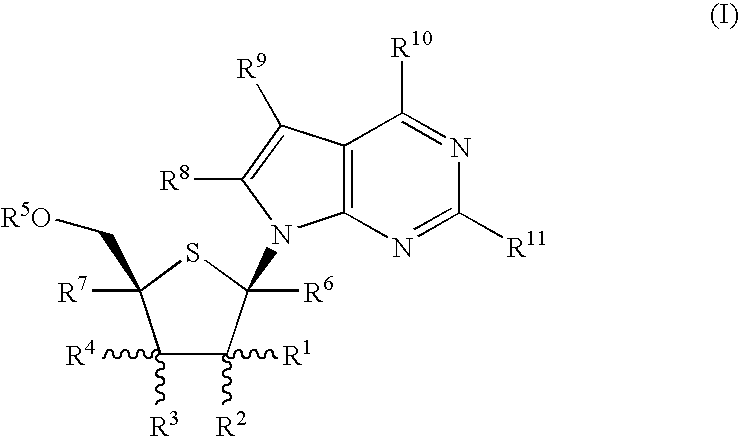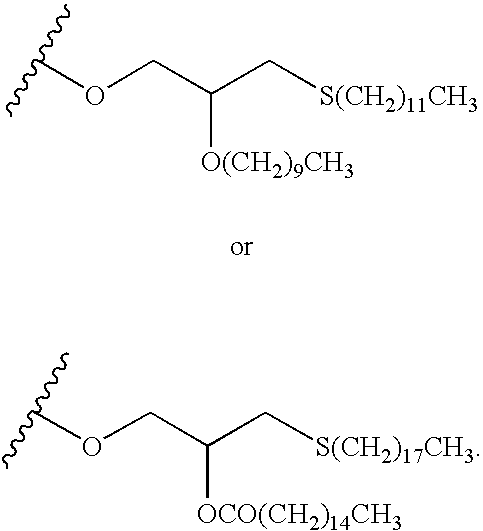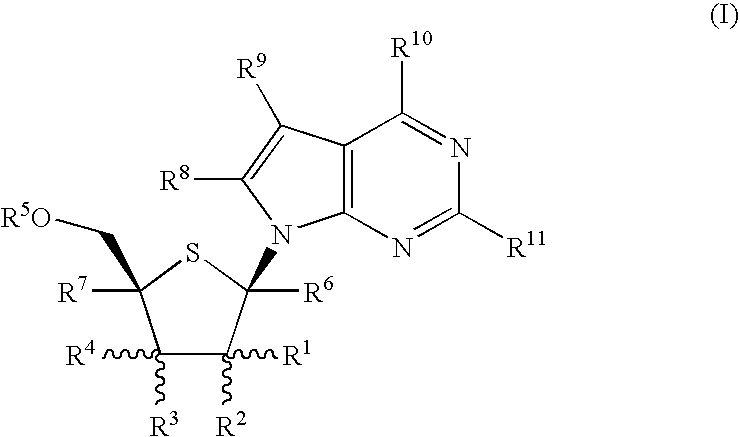Thionucleoside derivatives as inhibitors of rna-dependent rna viral polymerase
a technology of thionucleoside and viral polymerase, which is applied in the direction of heterocyclic compound active ingredients, biocide, organic compounds of group 5/15 elements, etc., can solve the problems of limited clinical benefit, no established vaccine for hcv, and treatment of hcv infection
- Summary
- Abstract
- Description
- Claims
- Application Information
AI Technical Summary
Benefits of technology
Problems solved by technology
Method used
Image
Examples
example 1
4-Amino-7-(2-C-methyl4-thio-β-D-ribofuranosyl)-7H-pyrrolo[2,3-d]pyrimidine (1-12)
Step A: Methyl L-xylofuranoside (1-1)
[0122] This compound is prepared according to the procedure described in J. Med. Chem. 41: 3865 (1998). L-Xylose is stirred in 0.5N HCl in anhydrous MeOH for 5-10 h at room temperature. The reaction mixture is neutralized with Amberlite IRA-400 OH or Dowex—X200 anion exchange resin. The resin is removed by filtration. The combined filtrate and washings are concentrated to an oil which is subjected to column chromatography on silica gel using a mixture of CH2Cl2 and MeOH as the eluent to afford compound 1-1 as an α / β anomeric mixture.
Step B: 2,3,5-Tri-O-(2,4-dichlorobenzyl)-1-O-methyl-L-xylofuranose (1-2)
[0123] Compound 1-1 from Step A is dissolved in anhydrous TBF and the solution is cooled in an ice bath. To the cold solution is added sodium hydride (60% dispersion in mineral oil) and the reaction mixture is stirred for 35 to 45 min under an argon atmosphere. To...
example 2
2-Amino-7-(2-C-methyl-4-thio-β-D-ribofuranosyl)-7H-pyrrolo[2,3-d]pyrimidin-4(3H)-one (2-7)
Step A: 2-Amino4-chloro-7-[2,3,5-tri-O-(2,4dichlorobenzyl)-4-thio-β-D-arabinofuranosyl]-7H-pyrrolo[2,2,3-d]pyrimidine (2-1)
[0134] To a solution of the compound 1-5 from Step E of Example 1 (1 eq.) in anhydrous dichloromethane at 0° C. is added HBr (5 eq) dropwise. The resulting solution is stirred at 0° C. for 1 h and then at room temperature for 3 h, evaporated in vacuo and co-evaporated with anhydrous toluene. The oily residue is dissolved in anhydrous acetonitrile and added to a solution of the sodium salt of 2-amino-4-chloro-1H-pyrrolo[2,3-d]pyrimidine [for preparation of similar compound, see J. Chem. Soc., 131 (1960)] in acetonitrile [generated in situ from 2-amino4-chloro-1H-pyrrolo[2,3-d]pyrimidine (3 eq) in anhydrous acetonitrile and NaH (60% in mineral oil, 3 eq), with stirring at room temperature for 4 h]. The reaction mixture is stirred at room temperature for 24 h, and then evapo...
PUM
| Property | Measurement | Unit |
|---|---|---|
| temperature | aaaaa | aaaaa |
| temperature | aaaaa | aaaaa |
| temperature | aaaaa | aaaaa |
Abstract
Description
Claims
Application Information
 Login to View More
Login to View More - R&D
- Intellectual Property
- Life Sciences
- Materials
- Tech Scout
- Unparalleled Data Quality
- Higher Quality Content
- 60% Fewer Hallucinations
Browse by: Latest US Patents, China's latest patents, Technical Efficacy Thesaurus, Application Domain, Technology Topic, Popular Technical Reports.
© 2025 PatSnap. All rights reserved.Legal|Privacy policy|Modern Slavery Act Transparency Statement|Sitemap|About US| Contact US: help@patsnap.com



